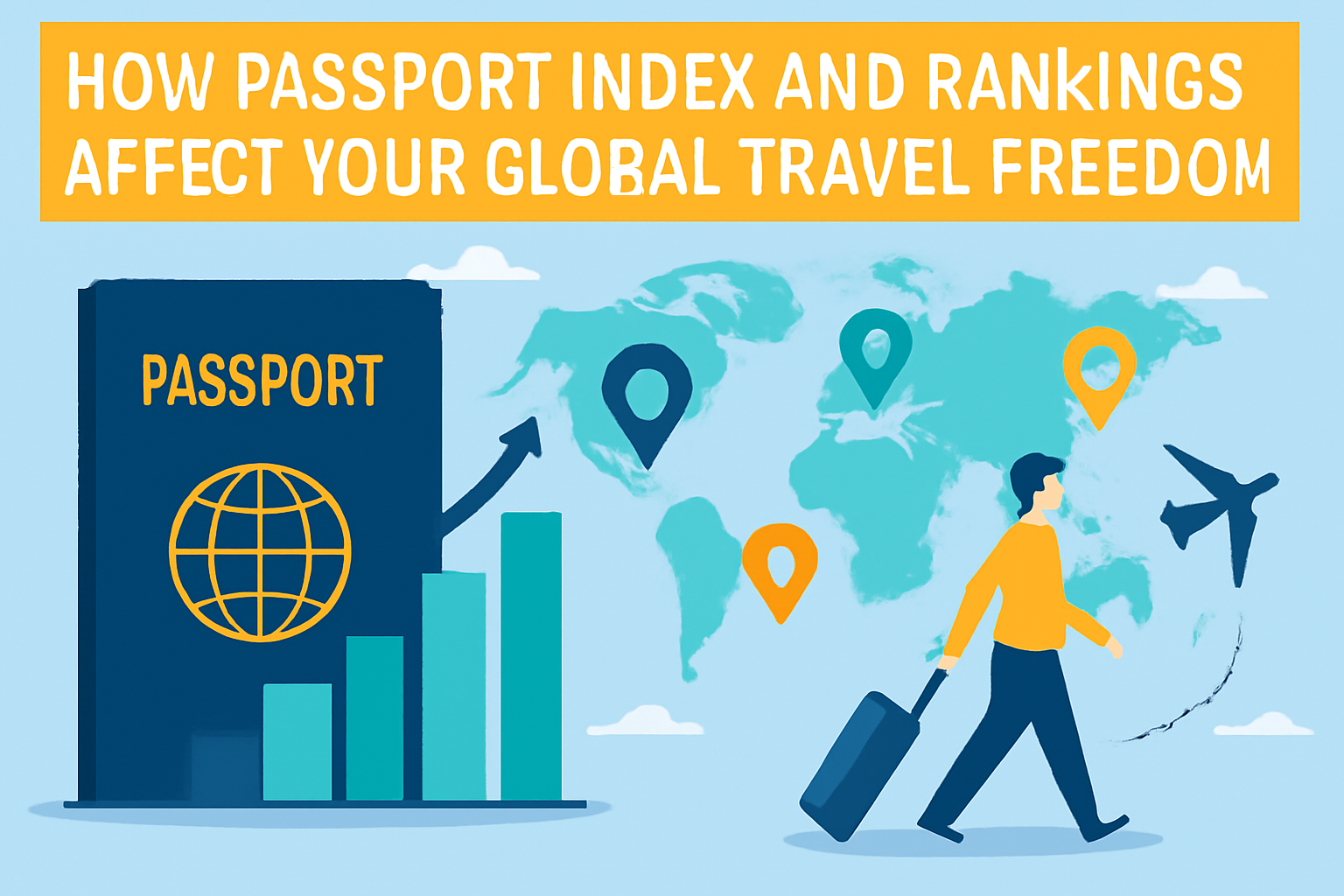How Passport Index and Rankings Affect Your Global Travel Freedom

In today’s interconnected world, the ability to travel freely across borders has become a crucial aspect of personal freedom and opportunity. Whether for business, leisure, or even in pursuit of education, the ease with which you can move between countries influences many facets of your life. One key factor in determining how easy it is for a person to travel is the strength of their passport. A passport not only serves as proof of identity and nationality but also reflects the global mobility a person is afforded. The strength of a passport is often determined by the countries that its holders can visit without requiring a visa. Passport rankings, then, have a direct impact on the freedom you enjoy when traveling abroad.
Understanding Passport Rankings
Passport rankings are an essential tool used to evaluate the strength of a country’s passport based on its visa-free access to other nations. Countries with strong passports generally offer their citizens a wider range of opportunities to travel without the need for cumbersome visa applications. On the other hand, individuals holding passports from nations with lower rankings may encounter various barriers and bureaucratic obstacles when attempting to enter foreign countries. These rankings reflect both economic and political factors and play a significant role in how people experience global travel.
How Passport Rankings Affect Travel Freedom
The influence of passport rankings on travel freedom is considerable. If you hold a passport from a high-ranking country, you can enjoy a wide range of benefits, from quick visa processing to the ability to travel across multiple continents with minimal paperwork. For instance, citizens of countries with strong passports can often fly to numerous destinations in Europe, Asia, and the Americas without having to apply for a visa in advance. This flexibility not only saves time but also reduces the hassle involved in planning international trips. Furthermore, the ability to travel freely opens doors to better job opportunities, investment possibilities, and the ability to explore different cultures without restrictions.
On the other hand, the limitations imposed on passport holders from countries with weaker rankings can be frustrating. Those who possess passports ranked lower may find themselves needing to go through lengthy visa application processes, which often involve time-consuming paperwork, interviews, and approval delays. In some cases, visa denials can even block travel entirely, which means that their global movement is significantly restricted. As a result, people with passports from lower-ranked countries may feel limited in their ability to engage with the global community, whether for personal or professional reasons.
For many people, knowing their passport index and ranking provides a sense of understanding regarding their travel freedom. It can influence decisions about which countries to visit, work in, or even relocate to. The stronger the passport, the more freedom one has to explore and engage with the world, whether that involves attending business meetings in distant cities or enjoying a spontaneous vacation.
Economic and Diplomatic Implications of Passport Rankings
Passport rankings do not just influence travel freedom; they also reflect the broader economic and diplomatic landscape of a country. Countries with higher passport rankings typically have strong global relationships, solid diplomatic ties, and high economic development. This strength often stems from the country’s ability to negotiate favorable visa agreements with other nations. Countries with established political stability and robust diplomatic practices can secure visa-free travel agreements for their citizens, enhancing the global mobility of their people.
In contrast, nations with weaker passport rankings may face challenges in fostering these international relationships. Diplomatic isolation or weaker economic standing can limit a country’s ability to enter into mutually beneficial agreements with other countries, restricting the freedom of movement for its citizens. The economic development of a country plays a significant role in determining the strength of its passport, as wealthier nations are often able to leverage their economic power to negotiate more travel-friendly arrangements with other governments.
The Role of Passport Index in Global Mobility
The Passport Index offers a comprehensive framework for evaluating the global mobility afforded by a passport. It is more than just a ranking—it provides detailed insights into the political, economic, and diplomatic factors that contribute to a nation’s global standing. For travelers, the Passport Index can serve as a valuable resource for making informed decisions about where to travel or invest. It allows individuals to compare the freedom of movement between different nations and gauge the relative ease or difficulty of accessing various regions of the world.
Countries that perform well in the Passport Index often enjoy a more favorable global reputation, which can translate into better business opportunities and increased access to international markets. Citizens of these nations are more likely to experience seamless travel, whether they’re crossing borders for work, leisure, or education. By contrast, countries with lower passport rankings may face challenges in accessing new markets or building connections with other nations, which could hinder both individual and national progress.
Global Travel Freedom as a Catalyst for Personal Growth
The ability to travel freely is not only about convenience; it’s a catalyst for personal growth and broader societal progress. Traveling allows individuals to immerse themselves in diverse cultures, languages, and ways of life. It opens the door to learning, networking, and personal development in ways that may not be possible without access to multiple countries. Strong passport rankings grant people the freedom to explore the world, make new connections, and broaden their horizons in ways that would be impossible without the ability to move freely between countries.
Moreover, individuals who possess strong passports can take advantage of opportunities to live, work, and study in different parts of the world. This type of mobility enhances one’s global perspective, which can be incredibly valuable in today’s interconnected job market. Whether you’re pursuing an international career or simply seeking personal enrichment, the ability to travel without restrictions is an essential aspect of modern life. The broader your global reach, the more opportunities you are likely to encounter.
Conclusion
Ultimately, passport rankings have a profound effect on how people experience global mobility. A higher passport ranking offers increased travel freedom, making it easier to explore the world, seize business opportunities, and experience different cultures. For individuals seeking personal and professional growth, the ability to travel without bureaucratic barriers is an essential aspect of achieving their goals. In contrast, those with passports from lower-ranking countries may encounter various obstacles, which can limit their ability to fully participate in the global community.
In a world where global mobility is more important than ever, understanding how passport rankings impact your freedom of movement is vital for anyone looking to explore the world or build connections abroad. To learn more about how these rankings work, visit https://www.aptcitizenship.com/passport-index-and-ranking/.




